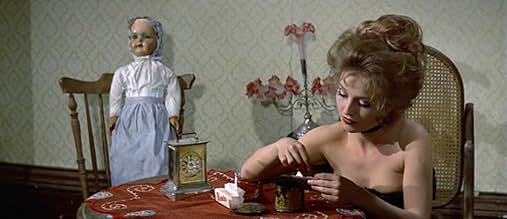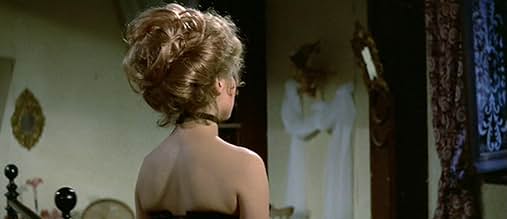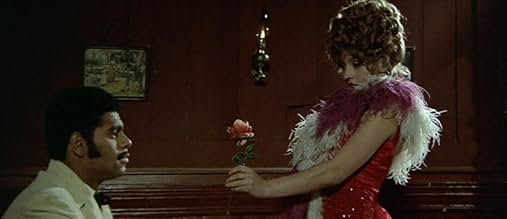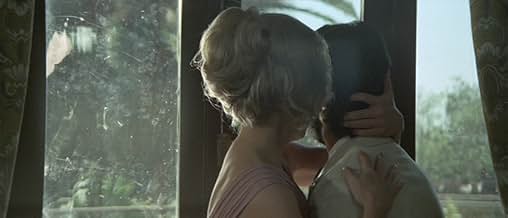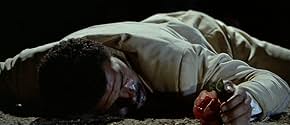Whity
- 1971
- 1h 35min
CALIFICACIÓN DE IMDb
6.4/10
1.2 k
TU CALIFICACIÓN
Whity es el mayordomo mulato de una disfuncional familia sureña en 1878. Whity siempre intenta seguir las ordenes de los señores, hasta que un día recibe una petición de asesinato.Whity es el mayordomo mulato de una disfuncional familia sureña en 1878. Whity siempre intenta seguir las ordenes de los señores, hasta que un día recibe una petición de asesinato.Whity es el mayordomo mulato de una disfuncional familia sureña en 1878. Whity siempre intenta seguir las ordenes de los señores, hasta que un día recibe una petición de asesinato.
- Premios
- 2 premios ganados y 2 nominaciones en total
Günther Kaufmann
- Whity
- (as Günter Kaufmann)
Harry Baer
- Davy Nicholson
- (as Harry Bär)
Tomás Martín Blanco
- Fake Mexican physician
- (as Tomas Blanco)
Peter Berling
- The Hefty Bartender
- (sin créditos)
Rainer Werner Fassbinder
- Saloon guest
- (sin créditos)
Kurt Raab
- The Pianist
- (sin créditos)
- Dirección
- Guionista
- Todo el elenco y el equipo
- Producción, taquilla y más en IMDbPro
Argumento
¿Sabías que…?
- TriviaNever released in theaters.
- ConexionesFeatured in Fassbinder in Hollywood (2002)
Opinión destacada
I barely got through this movie, this kind of half-western half super-dark satire on racism and slavery that makes Bamboozled look like Fraggle Rock... So why the high rating? Possibly just because there's nothing else quite like it. It's about a slave, dubbed Whity by his master/family for his propensity for 'sucking up' (Günter Kaufmann, a frequent actor in Fassbinder's stockade of sorts, who I still can't tell whether or not he's actually a good actor or appears to be so), and his master (Ron Randell) and his family, which includes a wife and two children, one retarded and one homosexual, and there are sometimes very strange requests or orders- like killing other members of the family for things like obvious adultery or the murder by the master of said adulterer (I think that's what happened at one point).
One of the things about the movie that's just totally weird, and yet very weirdly effective, is that the slave owner and family have white make-up put over their already white faces (again, the inverse of Bamboozled, only here not so smug about it being "hey, it's satire!"), and that all of the characters- save maybe for a few minor characters or a supporting one like the saloon singer who falls for Whity- have an affected way of speaking, deliberate like everyone is under some strange spell. What is it all a symbol for? I think, maybe, that racism is so ugly and horrible a thing one can barely ever capture how it affects everyone around them, white or black (the only somewhat down-to-earth figure, Whity's mother played very convincingly by Elaine Baker, is all too brief in the mix for a reason). Fassbinder uses the backdrop of the old west, of a kind of fragmented version of it (he uses sets from other movies, intentionally I'd wager), where this savage but almost meditative story can take place.
Whity shouldn't be something to see right away if you're just getting into Fassbinder - since I'm one of them, I can attest to it being a difficult film - but there's a power about it, some really unique pull to it in some scenes (watch when Whity asks the retarded boy to come over the comb the horse, very tense, erotically so but cruel), that it's hard not to find it at some point if you become an admirer of the prolific German's oeuvre. I'm not even sure I would watch it again, but I know I didn't exactly regret the chance at witnessing risky art.
One of the things about the movie that's just totally weird, and yet very weirdly effective, is that the slave owner and family have white make-up put over their already white faces (again, the inverse of Bamboozled, only here not so smug about it being "hey, it's satire!"), and that all of the characters- save maybe for a few minor characters or a supporting one like the saloon singer who falls for Whity- have an affected way of speaking, deliberate like everyone is under some strange spell. What is it all a symbol for? I think, maybe, that racism is so ugly and horrible a thing one can barely ever capture how it affects everyone around them, white or black (the only somewhat down-to-earth figure, Whity's mother played very convincingly by Elaine Baker, is all too brief in the mix for a reason). Fassbinder uses the backdrop of the old west, of a kind of fragmented version of it (he uses sets from other movies, intentionally I'd wager), where this savage but almost meditative story can take place.
Whity shouldn't be something to see right away if you're just getting into Fassbinder - since I'm one of them, I can attest to it being a difficult film - but there's a power about it, some really unique pull to it in some scenes (watch when Whity asks the retarded boy to come over the comb the horse, very tense, erotically so but cruel), that it's hard not to find it at some point if you become an admirer of the prolific German's oeuvre. I'm not even sure I would watch it again, but I know I didn't exactly regret the chance at witnessing risky art.
- Quinoa1984
- 26 oct 2008
- Enlace permanente
Selecciones populares
Inicia sesión para calificar y agrega a la lista de videos para obtener recomendaciones personalizadas
- How long is Whity?Con tecnología de Alexa
Detalles
Taquilla
- Presupuesto
- DEM 680,000 (estimado)
- Tiempo de ejecución1 hora 35 minutos
- Mezcla de sonido
- Relación de aspecto
- 2.35 : 1
Contribuir a esta página
Sugiere una edición o agrega el contenido que falta


